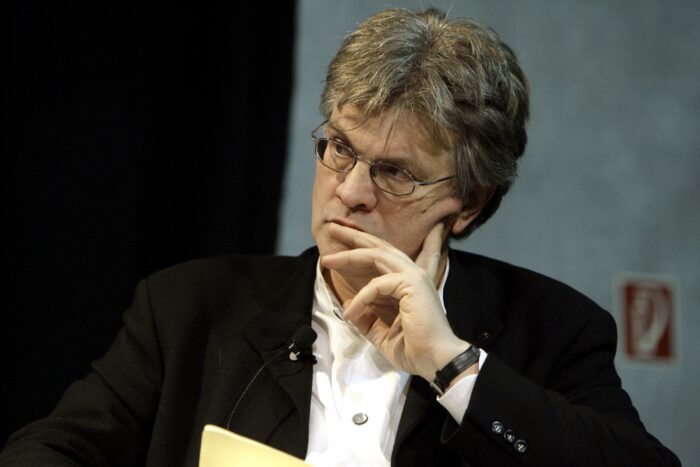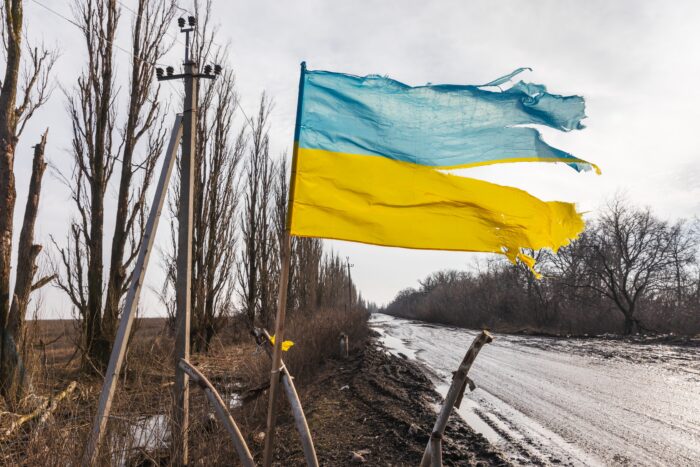The Progressive Post
Unequal best friends – China, Russia, and the war over Ukraine

We all remember the image of the two lonely dictators at the Winter Olympics in Beijing. Putin was the only international leader to attend, and he was courted accordingly. In return, he was allowed to take back home with him new trade contracts and the promise of ‘unlimited friendship’. Nevertheless, China cannot have been enthusiastic about the recognition of the ‘independent people’s republics’ of Luhansk and Donetsk that followed a few days later, the war that was about to begin and the inherent potential for chaos in the international system and the global economy.
Beyond domestic policies, where the main conflicting issues with the West lie (human and minorities rights, surveillance state), and its general doubts about democracy as a governance system, China presents itself as a constructive member of the international community: neutral, committed to peace and always ready to defend the territorial integrity and the right of peoples to self-determination. China participates in UN peacekeeping missions. Not only has it signed the Paris climate agreement: it has also committed in its constitution to create an ‘ecological civilisation’. A current policy document, initiated by President Xi Jinping, on the development strategy towards the 100th birthday of the establishment of the People’s Republic in 2049, stipulates that the policy of reform and opening-up should be continued. China will keep working for an international order that also takes the interests of developing countries into account, and the country will abstain from hegemonic and power politics.
In the last 30 years, Russia has returned to the international scene in a very different way. In this period of China’s unprecedented rise to become the world’s largest trading power, Russia has not been able to stand its ground in the global competition of economies and societies. It’s largely stuck at the stage of a commodity-dependent rentier economy. On this basis, Vladimir Putin – traumatised by the, in his opinion, inglorious end of the Soviet Union and frustrated by the arrogance and ignorance of an expansive West – has led Russia back onto the stage of international politics since taking office in 2000. Based on the modernisation of the army, this was done with the claim to be a world power.
Since then, and after a short period of indecisiveness (2000-2006/7) about where to go, Russia has not missed an opportunity to support anti-Western, anti-American and anti-democratic forces. Russia has distinguished itself as a violent military actor, ready and capable of multiple types of intervention: state terrorism, hybrid warfare, use of mercenary troops, a power of raiding and international brigandry. The war in Ukraine is the biggest adventure the president has thrown his country into so far.
The invasion of Ukraine, however, has so far resembled a military oath of disclosure of Vladimir Putin. It is a disaster for Russia. There are enormous losses in people and material, obvious tactical military mistakes, problems with the morale of the troops, logistics and the reconnaissance work of the services. The modernisation in recent years seems to have been accompanied by large-scale corruption. The consequences are symbolic humiliations such as the loss of the flagship of the Black Sea Fleet, or the failed attempt to capture the Ukrainian capital of Kyiv at the beginning of the war.
For Putin, the development of the conflict is becoming increasingly problematic, both domestically and externally. At home, the course of the war is likely to undermine his aura as a leader. And in terms of foreign policy, he cannot be indifferent when the leading medium of liberal capitalism, the Economist, titles: ‘How rotten is Russia’s army?’, as his claim to play in the court of the Great Powers is based on the assertion of Russia’s highly-modern professional and powerful army. The war is ongoing and could drag on for much longer. The West, including Europe, is united and NATO is about to expand to include the militarily well-equipped countries Sweden and Finland. The NATO military might rub their eyes. And they can be assured that they would be able to cope well with this opponent in a conventional war – unfortunately, however, Russia is a nuclear power.
Whatever the outcome of the war, it has already triggered dynamics that will have far-reaching global developments in their wake. It reinforces the de-globalisation tendencies that have been evident since the financial crisis 10 years ago and were accelerated by the Covid-19 pandemic.
Geo-politically, new power fields are emerging and geo-economically a reorganisation of the energy, production, distribution, and financial systems is emerging. In this context, China’s international status and its highly successful catching-up development model are increasingly challenged by Russia’s war and its close partnership with Putin.
Officially, China is neutral and pro-peace. It neither supported nor condemned the war. But this is a blatantly pro-Russian and anti-American neutrality, underscored by the adoption by state media and China’s censored internet of the Kremlin’s version of the causes and course of the war. There is an internal controversy in China about how to position oneself toward Russia. But as mediator for a negotiated solution, Beijing is a no-show – while it probably is the only country that could influence Vladimir Putin.
Economically, the People’s Republic has been in a development phase for some time, in which it is switching from quantitative to qualitative growth and is focusing more on the development of the domestic market. This next development step also requires open markets, functioning supply chains and rule-based international order. Unlike Russia, it is not in China’s interest to destroy the existing international order. It will be crucial for the country to watch closely how the West tries to shape de-globalisation in its favour. The United States has viewed China as a key geopolitical opponent, not only since Donald Trump’s presidency. In the EU’s perception, China has gone from being the largest market to being a strategic rival, and the European Parliament suspended ratification of a long-negotiated investment deal with China before the war.
Should the US, Europe, Japan and countries like South Korea, Canada, Australia and New Zealand – as a reaction to the Russian aggression in Ukraine – prioritise security and defence issues over economic and welfare aspects, and should they be willing and capable to make the necessary sacrifices, China’s trade might be adversely affected. Furthermore, the new dimension of Western sanctions, which go beyond anything previously known, will have far-reaching effects on the global economy. China is vulnerable in this area because the USA, Europe and Japan are still by far the most important markets for Chinese exports. Should market access in these countries be significantly restricted, the country will need other markets or its own domestic market to compensate for this – neither is in sight. Apart from shrinking export markets, China’s access to high-tech in the West is becoming more difficult too. Not only the USA has imposed sanctions on Huawei and semiconductor companies. In Europe, too, governments have recently banned the Chinese takeover of cutting-edge technology.
Another aspect of de-globalisation that is closely related to China’s own development model is likely to be of particular importance for China: the loss of efficiency gains through dynamic competition with rival Western companies at home. A central element of the success of the Chinese economic miracle was the decentralisation and the delegation of economic decisions, which promoted competition and creativity, leading to a fast improvement of the quality of China’s own products (but also accepted corruption for a long time). If this competitive pressure falls away, it remains to be seen how China’s innovative strength and the transition to a knowledge economy will develop.
The country’s domestic market is facing major economic and structural challenges: high levels of debt, an imploding real estate sector, and the progressive ageing of the population are putting a strain on growth. This is accompanied by extreme income inequality, an explosion in housing costs and welfare state institutions that are not yet fully developed to compensate for falling demand and to provide social cushioning.
In addition, there is an emerging failure of the Chinese zero-Covid strategy. The most recent lockdown in Shanghai has not only left economic scars, but also made it clear that the country is not prepared for the Omicron variant, and that its own vaccines cannot compete with those of the West. The brutal enforcement of the quarantine rules revealed a political dimension of the Covid strategy pursued until now. The population seems to be reacting with increasing incomprehension and contradiction to the government’s seemingly senseless harshness. And the question is whether the actions of the authorities should be attributed to the general trend toward a re-centralisation of power in the party and with President Xi. The loss of international reputation to which China was exposed as a result of speculation about the outbreak of the pandemic in Wuhan, which seemed to have been made up for by the supposed control of the pandemic in the meantime, is likely to increase again as a result of recent events.
Against this background, it is clear that, already at the current state of the conflict, China’s proximity to Putin is becoming an increasing problem. The course of the war so far indicates that if the Russian side continues to be unsuccessful, it could react with further brutalisation and escalation of the fighting, or possibly consider using chemical or even tactical nuclear weapons.
China will not be able to go down this path if it does not want to risk the international reputation it has carefully and cleverly built up over decades and thereby call its own development successes into question. Putin should therefore not count on China to help him break Western sanctions or even save him militarily. Significantly, while China has signed partnership agreements with Russia, it has not formed an alliance that could entail mutual support obligations. Russia should have no illusions; China has so far been an exceptionally self-interested power in international politics. Unlike Russia, China can choose how it emerges from the conflict. It can calmly analyse the sanctions against Russia and their effects. And with regard to its Taiwan cravings, Beijing will monitor the course of the war and assess what risks it might be willing to take.
China may be better off with a war-weakened Russia than with an imperially upgraded partner that would pose an ever-growing threat to the international system. The Russian dictator and his clique have manoeuvred themselves and their country into a situation that they did not foresee and from which it is becoming increasingly difficult to imagine a face-saving way out. It is becoming increasingly clear that the fabricated reason for the war, which denies Ukraine’s right to exist, stems from the twisted mind of a dictator who has mutated into an amateur historian while being isolated during the pandemic.
Putin pretends to be waging the war in Russia’s interests. But Russia is a multi-ethnic state, and there are probably enough ethnic groups who already think that this is not their war. Putin is now not only risking himself and his regime but the Russian Federation as a whole. Little now indicates that he will be able to fulfil his self-imposed mission of restoring Russia to imperial greatness within the borders of the Soviet Union. The opposite could be the case, with Russia emerging from the conflict weakened and smaller.The man in the Kremlin, who speaks fluent German and reveres classical German literature, may remember Johann Wolfgang von Goethe’s famous ballad The Sorcerer’s Apprentice. In the absence of his master, he called spirits with a magic spell, which he could no longer control: “Sir, my need is sore. Spirits that I’ve cited, My commands ignore”. And that is precisely what makes this war so extremely dangerous.
Photo credits: plavi011/shutterstock.com




